The Ultimate Guide to Choosing the Best Solar CRM in 2025
March 12, 2025
Every solar company understands that customer relationships matter, but the main question is: How do you actually do it?
You can have the best solar panels, the most competitive pricing, and a highly skilled team, but if you haven’t organized your customer relationships, they might look elsewhere.
As the solar industry thrives in 2025, it's time to upgrade from outdated systems! But with so many options available, how do you choose the best Solar CRM for your business?
Introducing the ultimate guide, where we will explore the key features to consider and the top CRM solutions for 2025, helping you make a wise investment that returns growth and efficiency. Let’s dive in!
Key Takeaways
- The complexity of solar sales arises from excess leads, time constraints, long sales cycles, compliance issues, data overload, and high expectations
- CRM Comparison: Leading 5 Solar CRM Solutions - Sunbase, Insightly, Scoop, Salesforce Sales Cloud, Shape
- Solar companies commonly make the following mistakes: choosing generic CRMs, neglecting mobile access, underestimating training, dismissing integration, and failing to evaluate ROI.
- Calculate the ROI of a Solar CRM with 3 simple steps: identify costs, measure benefits, and use a simple formula.
Understanding The Difference Between Solar CRM vs Generic CRM
A "Solar CRM" is a customer relationship management software specifically built for the solar energy sector. It is designed to handle solar businesses' distinct processes and requirements.
In contrast, a "Generic CRM" is a more generalized platform that can serve any business, providing standard features without the industry-specific functionalities necessary for solar sales and installations.
To cut a long story short: A solar CRM is tailored for the solar industry, while a generic CRM is created to be flexible for various businesses.
A must-read: Understanding Solar CRM: A Beginner's Guide
Why Does Your Solar Business Need a Solar CRM Software in 2025?
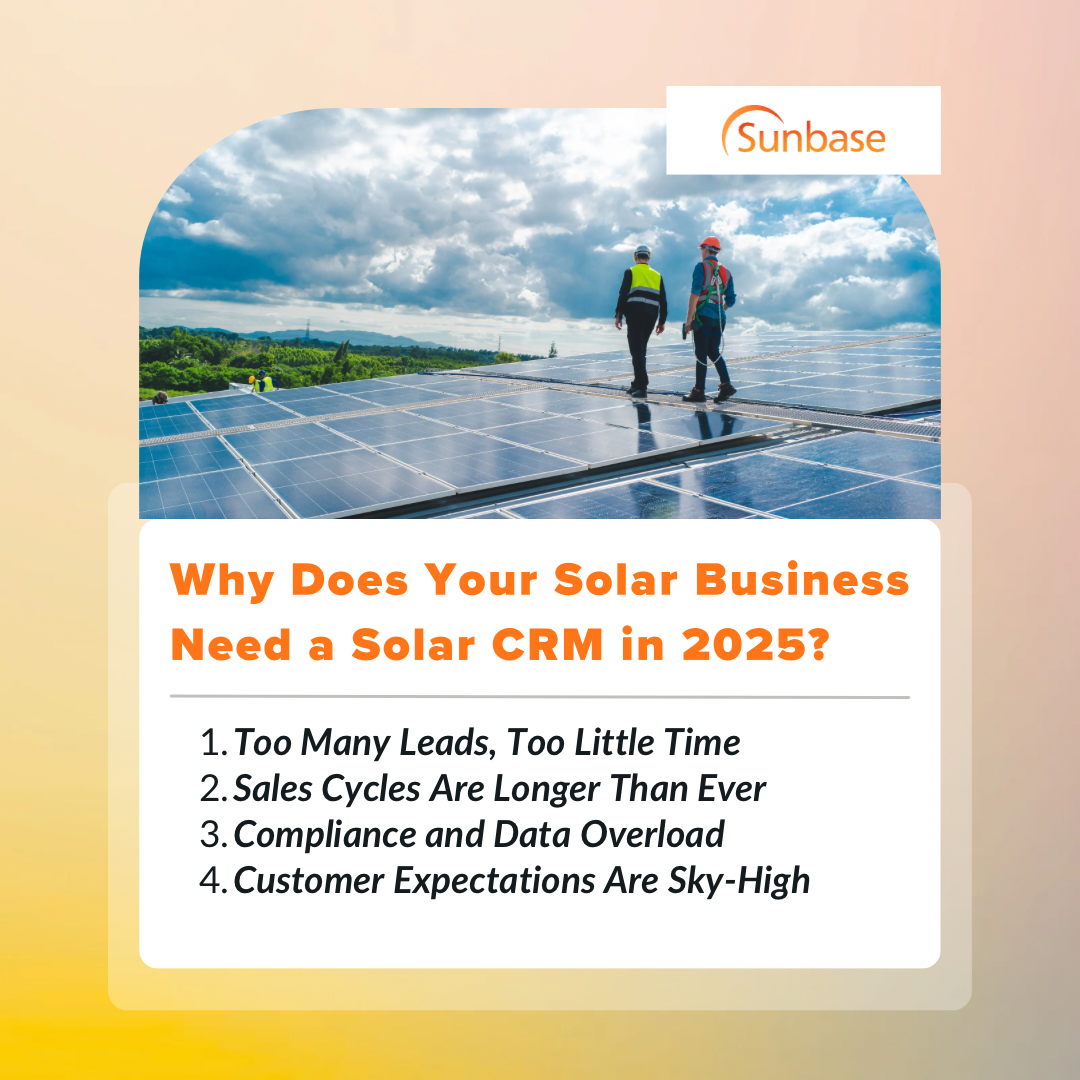
> The Growing Complexity of Solar Sales
Here’s what’s making things more difficult for your team:
1. Too Many Leads, Too Little Time
Homeowners are flooded with solar options, and your team is overwhelmed by inquiries from social media, referrals, and door-to-door efforts.
2. Sales Cycles Are Longer Than Expectations
Solar isn’t an impulse purchase. Customers require education, financing options, and trust—you need to track where each lead is in their journey.
3. Compliance and Data Overload
Maintaining compliance is increasingly challenging as regulations become stricter and customer data is spread across spreadsheets, emails, and calendars. Missing just one update or an outdated file can really set you back!
4. Customer Expectations Are Sky-High
They demand immediate updates regarding their installation, comprehensive financial projections, and responses to numerous inquiries. And they expect it without delay. If you can’t provide these, they’ll find someone who will.
Solar sales aren’t what they once were. If you are still relying on old methods, you will be one step back in 2025. It's high time to upgrade your old spreadsheets with advanced solar CRM!
So, how does a solar CRM solve these challenges?
What Are The Top Features Of A Solar CRM?
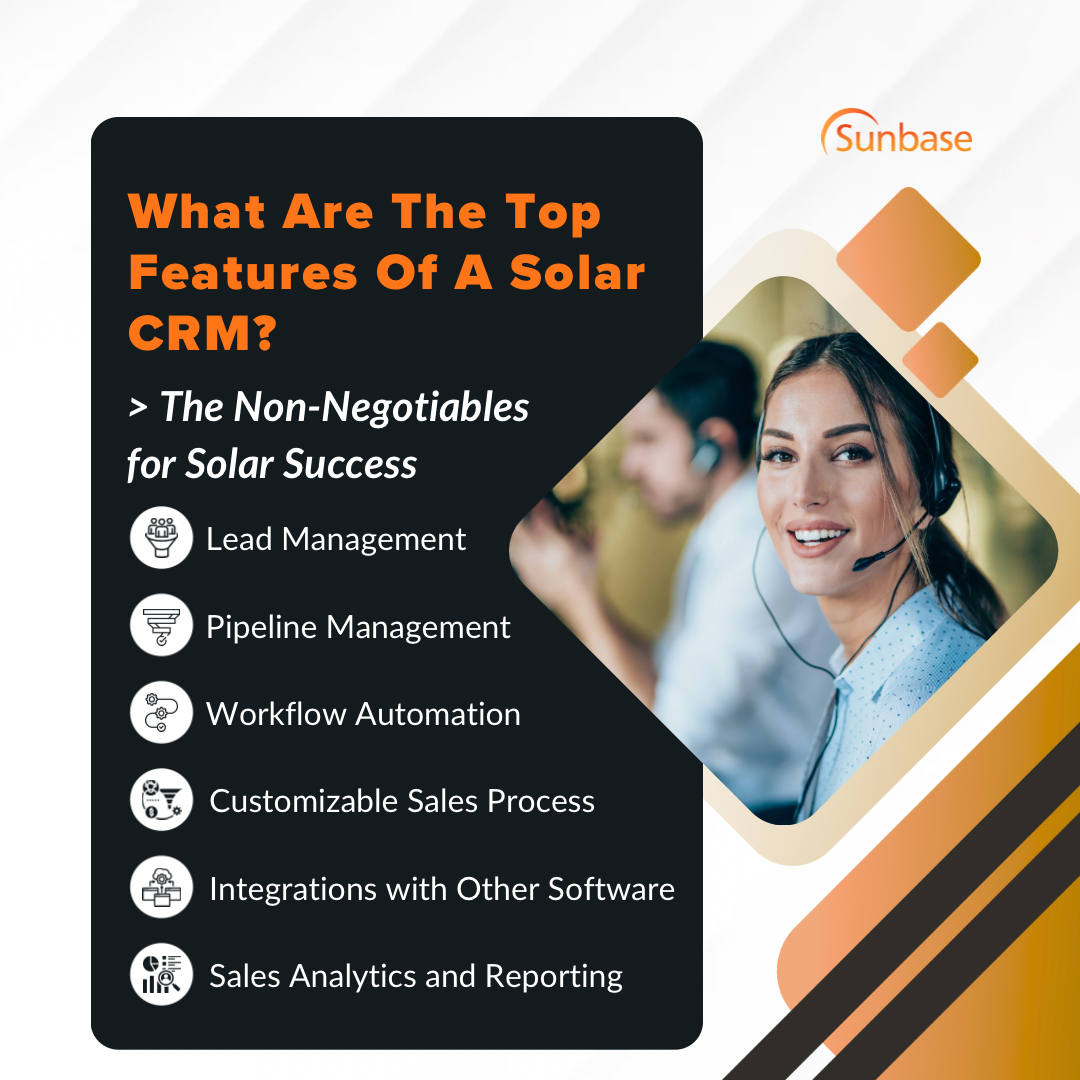
>The Non-Negotiables for Solar Success
1. Lead Management
What if you could easily capture and organize leads from various sources, stay informed about new leads, and know which ones are ready to make a purchase? Yes, you can!
Because a Solar CRM:
- Scores and helps prioritize your leads (Hot, warm, or cold).
- Keeps a record of every interaction, whether calls, emails, or even other channels!
- Sends nurturing drip campaigns that keep your leads engaged, even while you sleep!
2. Pipeline Management
Need to know where every deal is in your sales cycle? Is it a promising lead? Are they awaiting a proposal? Are they ready to sign on the dotted line.............?
A solar CRM's pipeline management feature provides a clear visual representation of your sales pipeline, allowing you to focus on closing and advancing deals. It gives you the clear visibility you need. How?
- Want to find out how many prospects are stuck in the “proposal sent” phase? Just a click, and there you have it!
- Helps track deals at different stages (consultation, proposal, financing, installation).
3. Workflow Automation
Here’s a truth: Repetitive tasks are the enemy of productivity. Why do chores machines can handle?
Automate repetitive tasks like follow-up emails, appointment scheduling, and proposal generation, allowing your team to concentrate on selling. You can be at ease because a solar CRM will:
- Auto-generates proposals and reduces manual data entry (More like the end of errors era).
- Activates follow-ups when a lead opens your email but does not respond.
- What's more? Schedules site surveys and sends reminders.
4. Customizable Sales Process
Wouldn’t it be better if your CRM adapted to your business instead of forcing you to adapt? And that’s the beauty of customization!
Regardless of whether you focus on residential installations, commercial projects, or battery storage solutions, a customizable sales process guarantees that your CRM works for you rather than against you. Why it matters, though?
- Every solar company sells differently, and one-size-fits-all fails.
- Enables you to establish custom deal stages, pricing models, and approval workflows.
5. Integrations with Other Software
Your solar business probably relies on various tools like accounting software, marketing platforms, project management systems, and beyond.
The last thing you need is another lone tool that doesn’t integrate well with others. Therefore, no integration = no collaboration. Ultimately, you'll have to juggle between tools! Does that sound like too much work already? So you need a CRM that works with:
- Solar design software (for generating accurate proposals)
- Accounting & invoicing tools (for effortless payments)
- Email & SMS platforms (for smoother customer communication)
- Project management tools (for tracking installations)
6. Sales Analytics and Reporting
You can’t improve what you don’t evaluate. A Solar CRM offers robust analytics and reporting features that deliver actionable insights into your sales performance. Have questions?
- Curious about which marketing channel produces the highest number of leads?
- Interested in your team’s closure rates?
- Need to identify bottlenecks in your sales process?
If you are relying on ancient, outdated reports, you might still be looking for past data! However, a
CRM dashboard can give you data immediately, which are all presented in easy-to-understand charts and graphs.
Take a look at The 10 Ways a Solar CRM Can Revolutionize Your Business Workflow.
CRM Comparison: Top 5 Solar CRMs in the Market
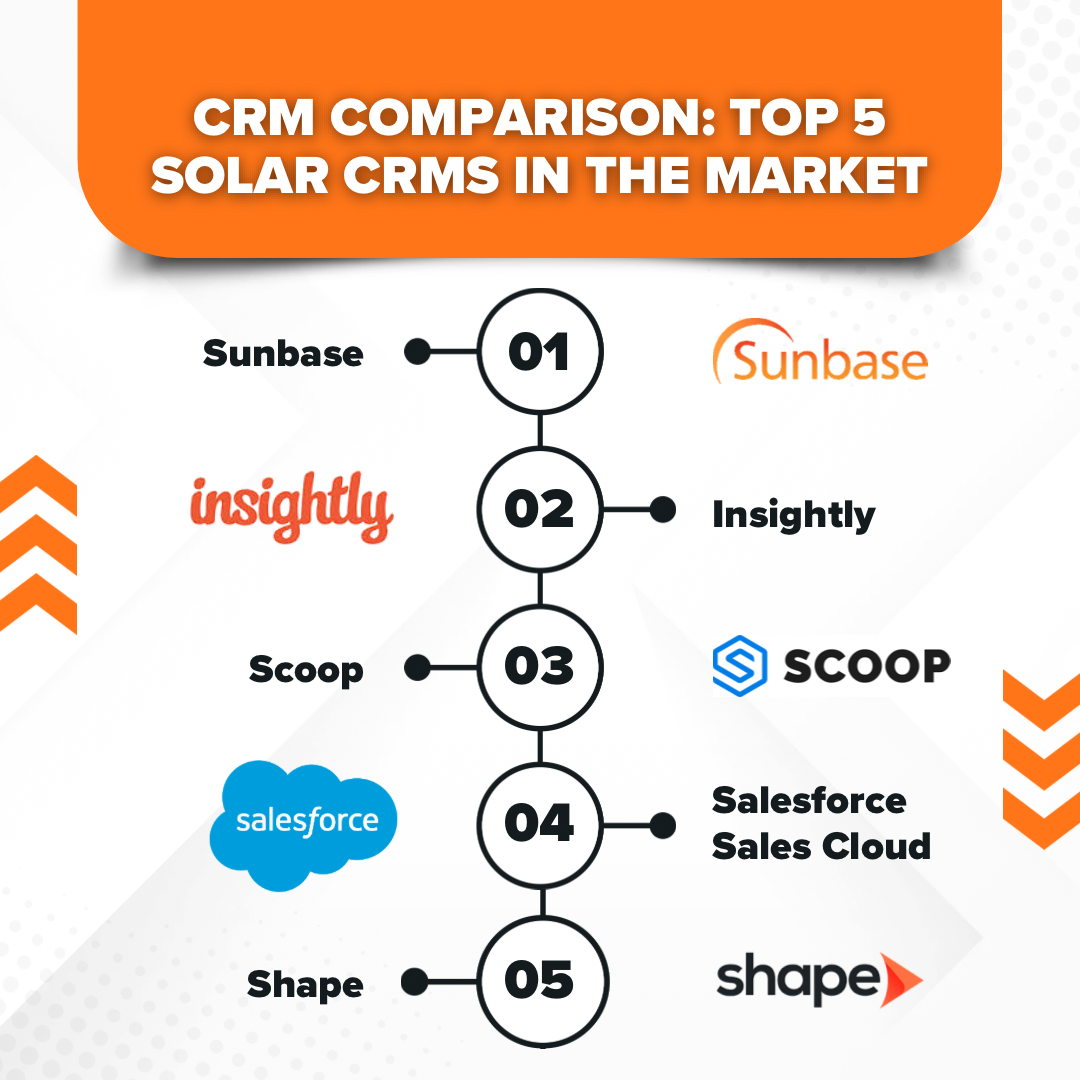
Let's find out what fits your needs!
1. Sunbase
Sunbase Solar CRM is a cloud-based solution for small, midsize, and enterprise sales and installation companies. It is affordable and effective for growing your business.
Sunbase enables solar companies to manage marketing, sales, leads, and projects on a single platform and centralizes operations from lead capture to project completion.
> Pros:
- Automates repetitive tasks such as follow-up emails and appointment reminders, which saves time and enhances efficiency.
- Monitors sales performance through real-time dashboards and leaderboards.
- Built with functionalities precisely suited for the solar sales process, such as site surveys, system design, and tracking of permits.
- You can access your CRM on the go with its convenient mobile apps designed for iOS and Android!
- Offers a centralized hub for storing detailed customer information, including interaction history and project specifics.
> Cons:
- Users may need initial training to maximize the software's features, particularly if they are unfamiliar with CRM systems.
> Review:
MonoLuxe Solar
"We cannot express enough how positive our experience has been working with SunBase. Truly a team that sticks to their word and focuses on making their product work for you."
2. Insightly
Insightly's CRM is designed for solar companies and is renowned for its project management and workflow automation tools. These features help solar businesses effectively oversee installation projects.
The platform allows users to easily manage and adjust project details, streamlining operations without extensive coding knowledge. This flexibility enhances efficiency and saves time.
> Pros:
- Accelerates sales and collaboration across the organization and Facilitates faster business growth through lead management and automated workflows.
- Integrates with all your solar business's apps, including accounting, HR, communication, etc.
- Automates data transfers between apps, reducing the need for complex code.
- Connects to popular financial services apps like QuickBooks Online, Xero, NetSuite, Sage, Workday, Stripe, PayPal, etc.
- Ensures data security and compliance with SOC 2 Type II, two-factor authentication, and EU/US Privacy Shield and GDPR compliance.
> Cons:
- The mobile app does not support offline access, and its user interface might appear outdated to certain users.
- Customization might demand additional effort.
> Review:
Bright Planet Solar
"Compared to other CRMs, Insightly's filters are very specific and provide a detailed look at each project and relationship."
3. Scoop
Scoop Solar CRM is well-regarded for solar energy companies that manage leads, track interactions, streamline sales, and oversee project installations and maintenance within a centralized platform. It serves as a "Central Operations Hub" for solar businesses.
> Pros:
- Accelerates installation and maintenance projects by collecting, organizing, and showcasing solar data, documents, and workflows.
- It centralizes data, documents, and communication, reducing errors and delays. With unlimited storage, it enhances team and contractor collaboration.
- Digitizes, mobilizes, and automates work processes with Scoop's Work Apps.
- Standardizes data collection using custom fields, checklists, photo uploads, and access control.
- Streamlines data access and team efficiency with 500+ integrations, connecting operations, CRM, helpdesk, inventory management, accounting, and invoicing software.
> Cons:
- Some users find the integrated calendar limiting and often rely on external apps for detailed scheduling.
- Depending on the solar business's size and complexity, some advanced functionalities might be missing.
- Some integrations require extra setup.
> Review:
BTCPOWER
"As the EV industry evolves, Scoop is our go-to solution to systematically define scope of work, schedule campaigns, assign resources, and track project completion."
4. Salesforce Sales Cloud
Salesforce stands out as a top CRM provider, with its Sales Cloud being exceptionally adaptable for solar companies. It includes robust internal communication features, task management capabilities, and sophisticated analytics designed to handle multiple deals at once.
> Pros:
- Offers comprehensive apps for marketing, sales, commerce, and service.
- Utilizes the MuleSoft integration platform and Tableau for real-time data integration and action.
- Einstein, built-in AI, automates most repeatable business functions.
- Hyperforce, a next-generation infrastructure architecture, ensures the secure and reliable delivery of Salesforce apps across all major public clouds.
- Adaptable and flexible, accommodating companies of any size and industry.
> Cons:
- Customizing a solar sales workflow may require significant changes, increasing time and cost.
- Salesforce's many features can complicate learning for new users, requiring thorough training.
- Salesforce costs can rise with more features and users, particularly for custom functionalities.
> Review:
Terence Sorrell Business Solutions
"Salesforce has become our global customer service platform. We can see everything we’re doing and everything we’ve done. It makes it easier for our people to do things in a standard way — and in a smarter way."
5. Shape
Shape's Solar CRM is an all-in-one platform for solar businesses, enhancing sales, project management, and service processes. With over 500 tools, such as an integrated dialer and email automation, it is the top CRM for solar panel installation.
> Pros:
- Effective solar lead management tools to track leads, manage follow-ups,
- Provides a comprehensive range of features designed specifically for solar companies.
- Offers powerful reporting and analytics options.
- Includes phone, email, text, marketing, and lead distribution all-in-one
- Integrates well with Outlook, Gmail, Quickbooks, Zapier, Calendly, and many more
> Cons:
- New users may need training to leverage the system's features effectively.
- Significant customization might necessitate technical skills.
> Review:
Cove Company
"An exceptional CRM. There is a reason why it stands out as the leading CRM system. The Marketing Automation is amazing!"
Common Mistakes Solar Companies Make When Choosing a CRM
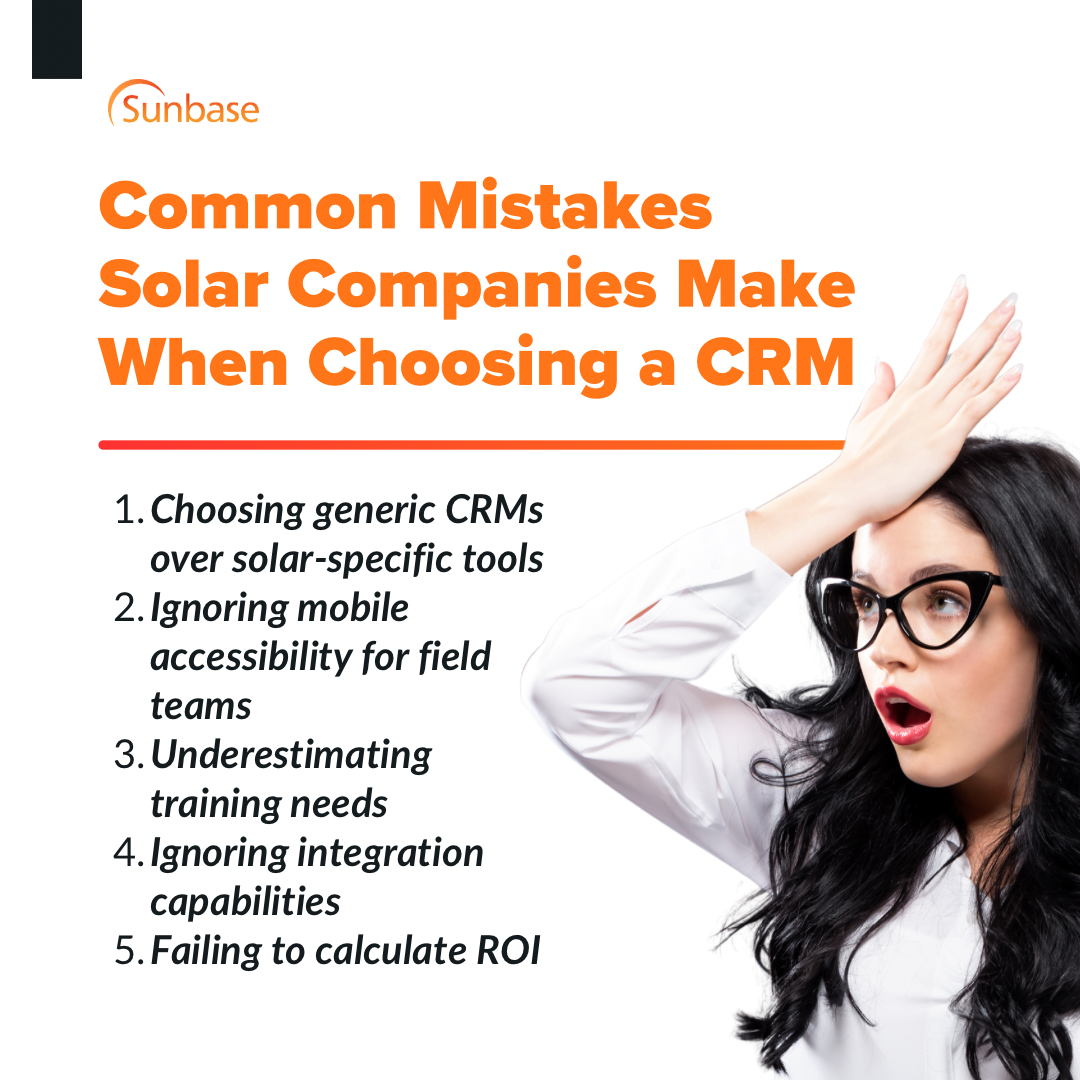
1. Choosing generic CRMs over solar-specific tools
“A CRM is just a CRM, right?” Answer: No!
Solar-specific CRMs understand your needs, including proposal templates, data centralization, financing integrations, and challenges. Skip the “workarounds” and select a tool made for your chaos.
2. Ignoring mobile accessibility for field teams
Your sales representatives are not confined to desks; they engage with customers, inspect roofs, and close deals. If your CRM lacks mobile compatibility, you risk leaving them and your business behind.
3. Underestimating training needs
The most common sentence after adopting CRM is, “They’ll figure it out!" Purchasing a CRM is only the beginning, but helping your team use it effectively is where the real journey begins. It’s worth investing in thorough onboarding so your team can thrive. Otherwise, you might find them turning to sticky notes.
4. Ignoring integration capabilities
Your CRM should fit into your ecosystem. Never underestimate the capability of integration. A CRM that doesn’t integrate well with your accounting software, email platform, or calendar creates more headaches than benefits.
5. Failing to Calculate ROI
A Solar CRM is an investment, not an expense.
Evaluate its genuine ROI: What is the time saved? How many additional deals are closed? The truth you can't deny: A CRM that wastes time is expensive.
Check out our blog to understand the ROI of Solar CRM for growing your business.
Let's find out how we calculate it!
How to Calculate the ROI of a Solar CRM
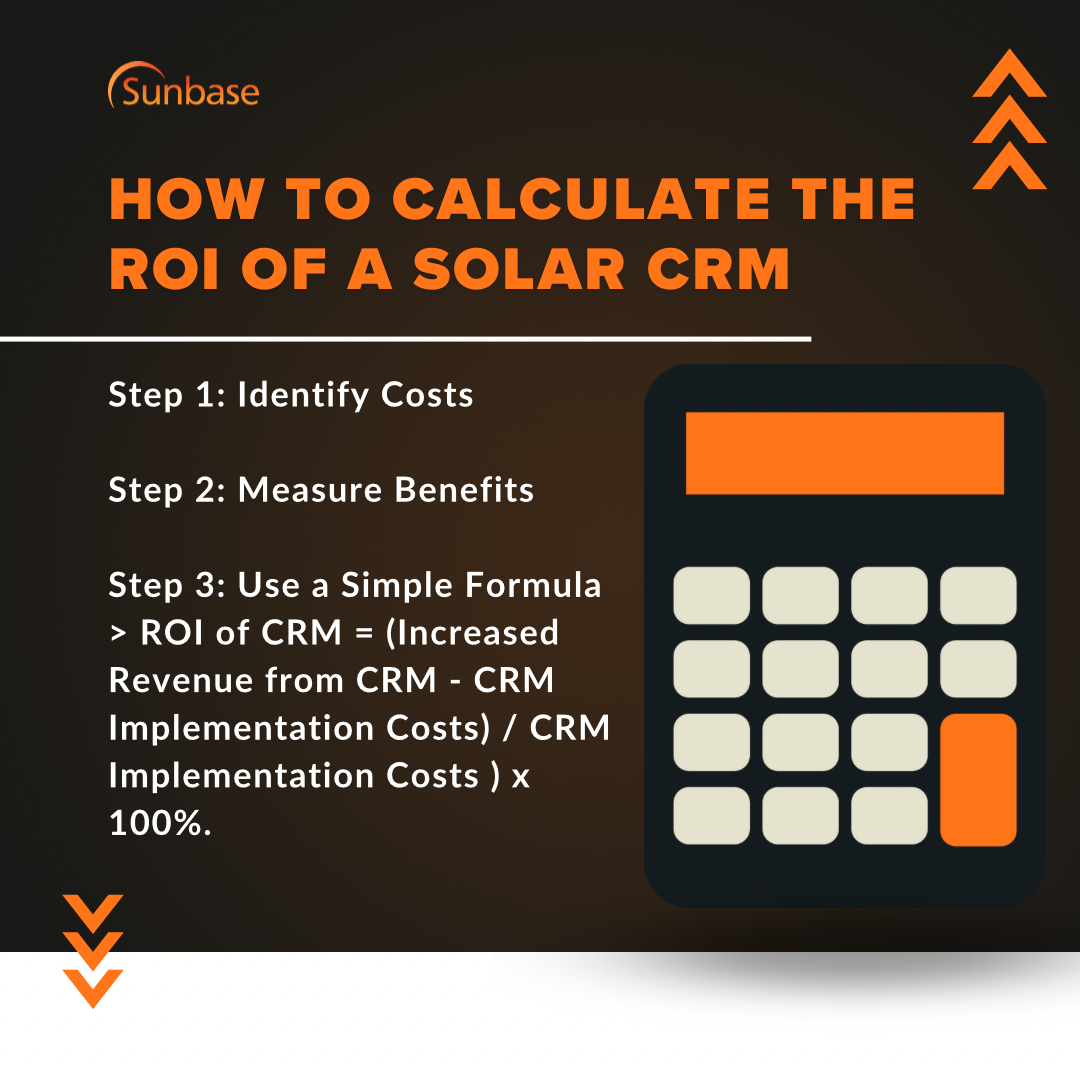
Is your choice to invest in a Solar CRM truly worth it? Here’s a guide to determine whether your CRM generates profit or drains resources. Let’s do some quick math!
Step 1: Identify Costs
First things first:
- Initial Setup Fees: One-time expenses related to software implementation, data migration, and configuration.
- Subscription Costs: Monthly or yearly subscription fees for the CRM.
- Training Expenses: Costs or time needed to train your team to use the CRM effectively.
- Ongoing Maintenance & Support: Additional expenses for updates, customizations, or premium support services.
Step 2: Measure Benefits
Now, let’s see how a solar CRM can help your business earn or save money. Properly adopting a CRM may result in:
- Increased close rates: Improved lead tracking, follow-ups, and automation allow sales representatives to convert more prospects into paying customers.
- Decreased labor hours: Sales automation reduces time spent on manual data entry, proposal generation, and follow-ups, resulting in lower administrative costs.
- Better customer retention: Satisfied customers are more likely to refer others and contribute to repeat sales.
- Quicker onboarding for new hires: A CRM simplifies the training process for new sales representatives, enabling them to start selling sooner.
Step 3: Use a Simple Formula
Finally, it's time to put everything together with a simple ROI formula:
ROI of CRM = (Increased Revenue from CRM - CRM Implementation Costs) / CRM Implementation Costs ) x 100%.
Tip: Don’t stop at Year 1. Your ROI improves over time as setup and training costs decrease while benefits increase.
Let’s cut through the fluff: A Solar CRM isn’t free, but not using one can be just as costly. Spending hours on manual tasks, losing good deals to competitors, and training new hires for weeks?
That’s far more expensive!
In a nutshell
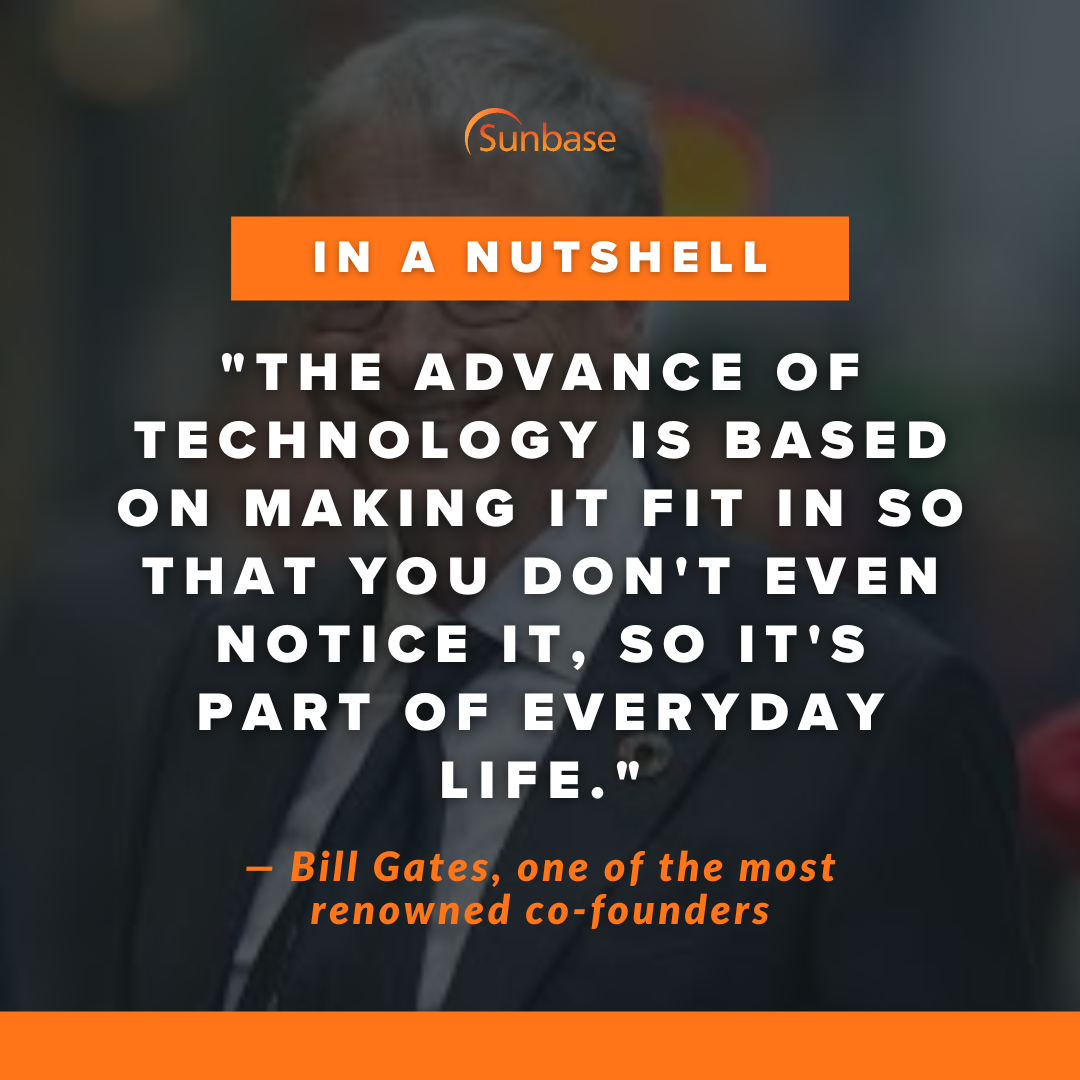
Bill Gates, one of the most renowned co-founders, once said, "The advance of technology is based on making it fit in so that you don't really even notice it, so it's part of everyday life."
A solar CRM is more than just software; it’s your catalyst to growth without exhaustion, boosting operational efficiency, managing customers, and outpacing competitors who are stuck in the ancient era.
So, decide: Would you prefer to spend this year overwhelmed by spreadsheets or closing deals while your CRM does the hard work?
About Sunbase
Effortlessly oversee everything from lead generation to installation tracking.
Set up in minutes, win deals for years. Sunbase Solar CRM is the ultimate solar assistant you need! Contact us here!
FAQs
1. Is it easy to implement Solar CRM in your business?
The implementation process varies by software provider; however, most CRMs offer onboarding assistance, sales team training sessions, and ready-made workflows tailored for the solar industry.
2. Why is a Solar CRM important for solar business?
It really makes a difference by improving how we operate, taking care of those tedious tasks, strengthening communication with our customers, and giving us valuable insights into sales performance. This all adds up to increased revenue and happier customers!
I agree to receive marketing messaging from Sunbase at the phone number provided above. I understand data rates will apply, and can reply STOP to OPT OUT.
Company
Industries
Features
Copyright ©2021
Terms of Service |
Privacy Policy







